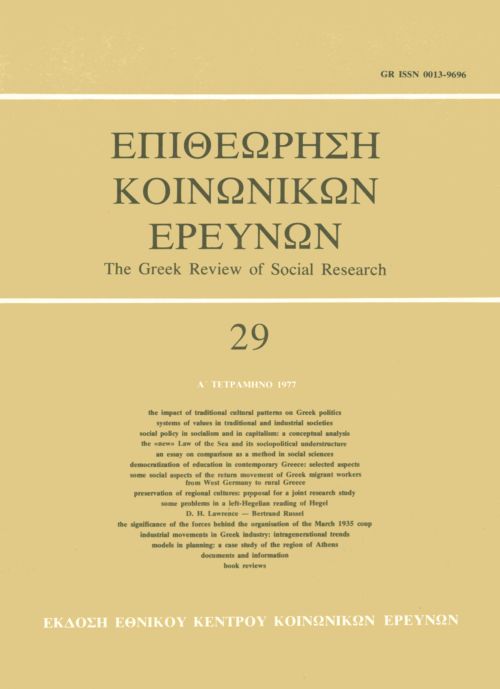An essay on comparison as a method in social sciences
Abstract
I would summarize the argument of this paper
in the following points:
a) Every scientific research is of political relevance
in the Aristotelian as well as in a politoeconomie
sense, or it is useless.
b) Time and space as the two definitional elements
of comparison give the historical dimension
of the phenomena. Difference or similarity of
phenomena is thus reduced to difference of similarity
of conditions at two or more points in time
and in space, which is a question of the reproducibility
of historical conditions.
c) Comparison as a method implies the comparability
of two things and aims at showing equality
between them or proving their inequality.
d) Comparability is a function of the concept used
to define a phenomenon and in this sense relative
by definition.
e) There are two distinct aspects in the process of
comparison: the one referring to the identification
of a phenomenon—which means defining its
properties—the other to the degree of similarity
(or equality) of two or more phenomena at two or
more different points in time and/or in space.
f) Comparison in a narrow sense as a method in
social sciences aims at measuring the degree of
similarity between two or more objects in time
and/or in space. The comparative method in a
narrow sense is thus the techniques and procedures
of research in the service of the above aim.
g) Every technique of measuring phenomena in
the process of comparing needs to be justified in
its scope, in its implications, finally in relation to
the object of measurement.
h) The operation of identification of phenomena
in the comparative method is common to all social
sciences. Comparison as an operation of
measuring the degree of similarity between two or
more phenomena is not identical in all social sciences.
The techniques of measurement for each
discipline differ according to the phenomena to be
observed and compared as well as according to
the general scope of comparing.
i) The comparative method in a narrow sense has
been proposed and developed in the postwar
period primarily as a method of comparing
phenomena across cultures and nations.
j) The main three plausible reasons for crosscultural
comparative research are: 1) the concern
with the economic development of developing
countries in the postwar period (historical
reason); 2) the testing of hypotheses and theories
beyond national boundaries aiming at revealing
«laws» (comparison as a substitute for experiment)
(methodological reason); 3) practical policy
aims (political reason).
k) The concept of «nation» is to be preferred
to the concept of «culture» in discussing comparison
as a method of social research; crosscultur-
al is taken, therefore, to mean crossnational.
l) Diffusion leads to a homogenisation of phenomena
across cultures and nations which has been increasing
in the postwar period although this has
not yet led to an elimination of national differences.
m) It is possible to observe tendencies across cultures
and nations, furthermore to detect developments,
but it is questionable whether it is possible
to compare them in a strict sense for three main
reasons referring to the problem of identification,
the reliability of data and measurement itself.
n) Crosscultural comparison aiming at testing
theories or general hypotheses must find in at
least two systems the causes leading to the same
effect in both of them (explanation part of a
theory), furthermore to fix the conditions that are
sufficient and necessary for a reproduction of the
same phenomenon at a later point in time or at a
different point in space (prediction part of a
theory). Such a task has been so far unsuccessful.
o) Policy implications arising out of a study in
other nations are only of conditional relevance for
some other. Even assuming the similarity of conditions
it is uncertain if the development of a
phenomenon will follow the same track in a new
country that it had followed in one or more other
countries previously.
p) Also the comparative method is either useless
or is of political relevance (point a). On the
grounds of conclusion under o, the comparative
method must be declared either as «useless» or
political in terms of politics, and not in terms of
policy implementation.
Article Details
- How to Cite
-
Nikolinakos, M. (1977). An essay on comparison as a method in social sciences. The Greek Review of Social Research, 29, 44–54. https://doi.org/10.12681/grsr.334
- Issue
- 1977: 29 Α'
- Section
- Articles

This work is licensed under a Creative Commons Attribution-NonCommercial 4.0 International License.
Authors who publish with this journal agree to the following terms:
- Authors retain copyright and grant the journal right of first publication with the work simultaneously licensed under a Creative Commons Attribution Non-Commercial License that allows others to share the work with an acknowledgement of the work's authorship and initial publication in this journal.
- Authors are able to enter into separate, additional contractual arrangements for the non-exclusive distribution of the journal's published version of the work (e.g. post it to an institutional repository or publish it in a book), with an acknowledgement of its initial publication in this journal.
- Authors are permitted and encouraged to post their work online (preferably in institutional repositories or on their website) prior to and during the submission process, as it can lead to productive exchanges, as well as earlier and greater citation of published work (See The Effect of Open Access).



